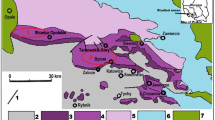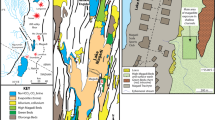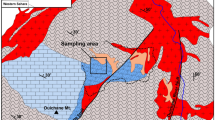Abstract
INVESTIGATIONS of sediments from the hypersaline environment of the Tuz Gölü, a seasonal salt lake in Central Anatolia, Turkey (Fig. 1), showed that huntite, CaMg3 (CO3)4, dolomite and magnesite are often present in the play a muds. More than 95 per cent of the sediments of the playa are made up of greyish-white to black muds with an average diameter of about 2 microns or less (silty clay muds). Large authigenic idiotopic gypsum crystals with a maximum length of 4 cm occur throughout the sediment.
This is a preview of subscription content, access via your institution
Access options
Subscribe to this journal
Receive 51 print issues and online access
$199.00 per year
only $3.90 per issue
Buy this article
- Purchase on Springer Link
- Instant access to full article PDF
Prices may be subject to local taxes which are calculated during checkout
Similar content being viewed by others

References
Kinsman, D. J. J., Amer. Mineral., 52, 1332 (1967).
Holser, W. T., Amer. Mineral., 51, 99 (1966).
Author information
Authors and Affiliations
Rights and permissions
About this article
Cite this article
IRION, G., MÜLLER, G. Huntite, Dolomite, Magnesite and Polyhalite of Recent Age from Tuz Gölü, Turkey. Nature 220, 1309–1310 (1968). https://doi.org/10.1038/2201309b0
Received:
Revised:
Issue Date:
DOI: https://doi.org/10.1038/2201309b0
This article is cited by
-
Mineralogy and Geochemistry of Sedimentary Huntite Deposits in the Egirdir-Hoyran Lake Basin of Southern Turkey
Journal of the Geological Society of India (2018)
-
Huntite deposits in the neogene lacustrine sediments of the Cameli basin, Denizli, SW Turkey
Carbonates and Evaporites (2003)
-
Morphology, distribution, and preservation potential of microbial mats in the hydromagnesite-magnesite playas of the Cariboo Plateau, British Columbia, Canada
Hydrobiologia (1993)
-
Sedimentationszyklen und stratigraphisch-fazielle Probleme der Randfazies des Unteren Muschelkalkes (Kernbohrung Mersch/ Luxemburg)
Geologische Rundschau (1977)
-
Formation and diagenesis of inorganic Ca?Mg carbonates in the lacustrine environment
Die Naturwissenschaften (1972)
Comments
By submitting a comment you agree to abide by our Terms and Community Guidelines. If you find something abusive or that does not comply with our terms or guidelines please flag it as inappropriate.


